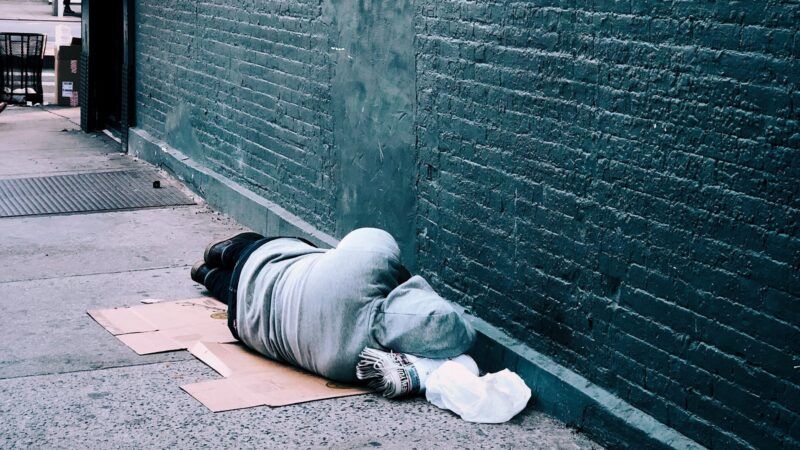Ending Poverty Requires Serious Policy, Not Political Platitudes
Another exercise in nonsense by state lawmakers in California.

At times, the California Legislature is reminiscent of a high-school student council, except that instead of working with few-hundred-dollar activities budget lawmakers are spending more than $300 billion in revenues. I'm not the first commentator to notice that politicians often promise things they can't possibly provide—and are no more realistic than a student body president offering free pizza on Fridays.
What can you do? Democracy is, as Winston Churchill said, "the worst form of government except for all those other forms that have been tried from time to time." Fast forward to the latest capitol silliness. A group of Democratic lawmakers is starting the End Poverty In California caucus, which is unlikely to be as EPIC as its name suggests. Ending poverty is a large promise—and the Legislature is much better at passing laws that exacerbate poverty (minimum wage, anti-competitive union work rules, onerous licensing requirements) rather than reduce it.
For starters, legislative caucuses are notoriously ineffective. They're the equivalent of those high-school clubs where like-minded people get together to engage in virtue signaling and whatnot. The state legislature has 16 caucuses centering on identity (gender, ethnicity), issues (aviation, environment), or locale (rural communities, the Bay Area).
The latest newsworthy caucus formation is the Problem Solvers Caucus, which promises to put good policy over partisanship, but which has accomplished nothing remarkable. We can only hope the "ending poverty" effort is equally ineffective given the people whose ideas it is based upon. Politico reports the name is a "nod to Upton Sinclair's 1934 gubernatorial campaign" and is the "brainchild" of former Stockton Mayor Michael Tubbs.
Sinclair was a socialist and Tubbs is best known for promoting "universal basic income." Sinclair's EPIC campaign plan promised to "develop a state-managed cooperative economy that would initially provide livelihoods for the unemployed while pointing the way to the eventual replacement of the private economy based on profit," the University of Washington explains.
The new EPIC chairman is Assembly Majority Leader Isaac Bryan (D–Los Angeles) so this comes from one of the Legislature's most powerful members. Tubbs has created a nonprofit group of the same name. He served as the mayor of one of the state's most impoverished cities—a San Joaquin Valley industrial city best known for its municipal bankruptcy (caused in part by excessive benefits for city employees) and atrocious crime rates.
Tubbs apparently was so busy basking in his national attention as a young progressive rising star that he didn't tend to matters at home. He lost re-election to a Republican political neophyte in a city with a two-to-one Democratic voter registration advantage. After his loss, he became an economic adviser to Gov. Gavin Newsom. Tubbs' major initiative was that privately funded project to provide $500 monthly in free money to select residents.
If you're still not understanding where this caucus is headed, then I'll quote from Tubbs' testimony at an Assembly subcommittee on poverty and inclusion, as captured in a video that his nonprofit released. Tubbs said the state has a "unique opportunity" to pass "common-sense, well-researched policies from baby bonds to guaranteed income to housing as a right to more affordable housing to truly make the state a golden one for all."
Baby bonds would have the government provide a set amount of money to every newborn child. Guaranteed income means the government would provide a stipend to everyone. Turning housing into a "right" means that landlords would lose the ability to evict tenants and also includes rent controls—even though "well-researched" studies have found such policies deplete the housing stock. More "affordable housing" means more subsidized housing.
Tubb's group is correct that poverty rates in California are atrocious. "California has the highest rate of poverty at 13.2% of any state in the U.S.," it notes. "28.7 percent of all California residents were poor or near poor in fall 2021." EPIC doesn't address that California's poverty rate is the worst in the nation—especially when cost-of-living factors are included—despite this being the nation's most progressive state. It offers the most generous welfare programs.
One would think that politicians who are serious about ending poverty would at least address that paradox. The video features union organizers who point to the need for an even more powerful union presence in our state, yet unions were on the vanguard of some of the state's most poverty-inducing policies—such as Assembly Bill 5, which tried to ban most forms of independent contracting and destroyed moderate-income jobs throughout the freelance economy.
With their progressive policies, lawmakers are destroying the incentive for developers to build more housing. They're always adding regulations and taxes that shutter businesses and discourage people from investing in new ones. Instead of recognizing that California's poverty problem largely is the result of government meddling, EPIC will propose more-aggressive interventions. At some point, lawmakers need to stop making unattainable high-school-level promises and begin wrestling with complex realities.
This column was first published in The Orange County Register.


Show Comments (97)